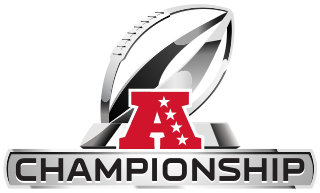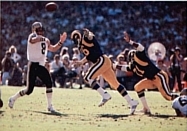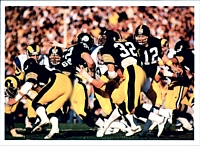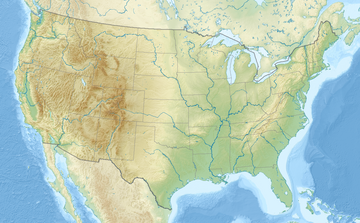
The American Football Conference (AFC) is one of the two conferences of the National Football League (NFL), the highest professional level of American football in the United States. The AFC and its counterpart, the National Football Conference (NFC), each contain 16 teams with 4 divisions. Both conferences were created as part of the 1970 merger between the National Football League, and the American Football League (AFL). All ten of the AFL teams, and three NFL teams, became members of the new AFC, with the remaining thirteen NFL teams forming the NFC. A series of league expansions and division realignments have occurred since the merger, thus making the current total of 16 teams in each conference. The current AFC champions are the Kansas City Chiefs, who defeated the Baltimore Ravens in the 2023 season's AFC Championship Game for their fourth conference championship.

The AFC Championship Game is the annual championship game of the American Football Conference (AFC) and one of the two semifinal playoff games of the National Football League (NFL), the largest professional American football league in the world. The game is played on the last Sunday in January by the two remaining playoff teams, following the AFC postseason's first two rounds. The AFC champion then advances to face the winner of the NFC Championship Game in the Super Bowl.
The American Football Conference – Western Division or AFC West is one of the four divisions of the American Football Conference (AFC) in the National Football League (NFL). The division comprises the Denver Broncos, Kansas City Chiefs, Las Vegas Raiders, and Los Angeles Chargers.
The 2004 NFL season was the 85th regular season of the National Football League (NFL).
The 2002 NFL season was the 83rd regular season of the National Football League (NFL).
The 2001 NFL season was the 82nd regular season of the National Football League (NFL), and the first season of the 21st century. The league permanently moved the first week of the regular season to the weekend following Labor Day. In the wake of the September 11 attacks, the NFL's week 2 games were postponed and rescheduled to the weekend of January 6 and 7, 2002. To retain the full playoff format, all playoff games, including Super Bowl XXXVI, were rescheduled one week later. The New England Patriots won the Super Bowl, defeating the St. Louis Rams 20–17 at the Louisiana Superdome.
The 1995 NFL season was the 76th regular season of the National Football League (NFL). The league expanded to 30 teams with the addition of the Carolina Panthers and the Jacksonville Jaguars. The two expansion teams were slotted into the two remaining divisions that previously had only four teams : the AFC Central (Jaguars) and the NFC West (Panthers).
The 1993 NFL season was the 74th regular season of the National Football League (NFL). It was the only season in league history where all NFL teams were originally scheduled to play their 16-game schedule over a span of 18 weeks and did so, where all of the Week 2 scheduled games were moved to an 18th week and the entire postseason was delayed by 7 days before starting). After the success of expanding the regular season to a period of 17 weeks in 1990, the league hoped this new schedule would generate even more revenue. This was also done to avoid scheduling playoff games on January 1 and competing with college football bowl games. The NFL's teams, however, felt that having two weeks off during the regular season was too disruptive for their weekly routines, and thus the regular season reverted to 17 weeks immediately after the season ended. 2021 marked the first season where an 18-week schedule would include 17 regular-season games.
The 1992 NFL season was the 73rd regular season of the National Football League (NFL). Due to the damage caused by Hurricane Andrew, the New England Patriots at Miami Dolphins game that was scheduled for September 6 at Joe Robbie Stadium was rescheduled to October 18. Both teams originally had that weekend off. This marked the first time since the 1966 NFL season and the AFL seasons of 1966 and 1967 that there were byes in week 1.

The 1987 NFL season was the 68th regular season of the National Football League (NFL). This season featured games predominantly played by replacement players, as the National Football League Players Association (NFLPA) players were on strike from weeks four to six with week three being cancelled in its entirety. This remains the last NFL season in which regular-season games were impacted by a labor conflict.
The 1983 NFL season was the 64th regular season of the National Football League. The Colts played their final season in Baltimore before the team's relocation to Indianapolis the following season. The season ended with Super Bowl XVIII when the Los Angeles Raiders defeated the Washington Redskins 38–9 at Tampa Stadium in Florida.

The 1980 NFL season was the 61st regular season of the National Football League.

The 1979 NFL season was the 60th regular season of the National Football League. The season ended with Super Bowl XIV when the Pittsburgh Steelers repeated as champions by defeating the Los Angeles Rams 31–19 at the Rose Bowl. The Steelers became the first team to win back-to-back Super Bowls twice.

The 1978 NFL season was the 59th regular season of the National Football League. The league expanded the regular season from a 14-game schedule to 16 games, which it remained in place until 2021 when it was increased to 17 games. Furthermore, the playoff format was expanded from 8 teams to 10 teams by adding another wild card from each conference. The wild card teams played each other, with the winner advancing to the playoff round of eight teams.

The 1973 NFL season was the 54th regular season of the National Football League. The season was highlighted by O. J. Simpson becoming the first player to rush for 2,000 yards in one season.
The 1970 NFL season was the 51st regular season of the National Football League, and the first after the consummation of the AFL–NFL merger. The merged league realigned into two conferences: all ten of the American Football League (AFL) teams joined the Baltimore Colts, Cleveland Browns, and Pittsburgh Steelers to form the American Football Conference (AFC); the other thirteen NFL clubs formed the National Football Conference (NFC).
As with all sports leagues, there are a number of significant rivalries between teams and notable players in the National Football League (NFL). Rivalries are occasionally created due to a particular event that causes bad blood between teams, players, coaches, or owners, but for the most part, they arise simply due to the frequency with which some teams play each other, and sometimes exist for geographic reasons.
The Los Angeles Rams are a professional American football team that plays and competes in the National Football League (NFL). The Rams franchise was founded in 1936 as the Cleveland Rams in the short-lived second American Football League before joining the NFL the next year. In 1946, the franchise moved to Los Angeles. The Rams franchise remained in the metro area until 1994, when they moved to St. Louis, and were known as the St. Louis Rams from 1995 to 2015. The Rams franchise returned to Los Angeles in 2016. This article chronicles the franchise's history during their time in Los Angeles, from playing at the Los Angeles Memorial Coliseum between 1946 and 1979, to playing at Anaheim Stadium in Anaheim from 1980 to 1994, and its return to Southern California beginning with the 2016 to 2019 seasons playing temporarily at their old home the Los Angeles Memorial Coliseum before moving to SoFi Stadium in Inglewood in 2020 alongside the Los Angeles Chargers.

The 49ers–Raiders rivalry, once commonly known as the Battle of the Bay, is a professional American football rivalry between the National Football League (NFL)'s San Francisco 49ers and Las Vegas Raiders. This rivalry is unique in that both teams are members of different conferences within the NFL and have never met in a postseason game. The rivalry stems from the proximity of Oakland and San Francisco in the northern Bay Area, and was formalised the first time the teams met after the AFL–NFL merger in the 1970 season. The geographic aspect of the rivalry ended in 2020, when the Raiders left California and relocated to Las Vegas, Nevada.










